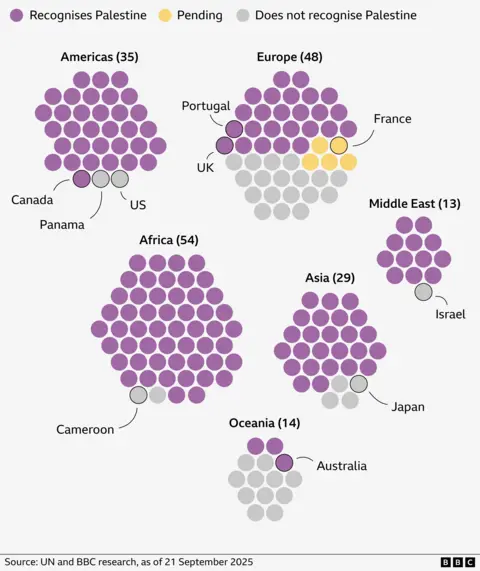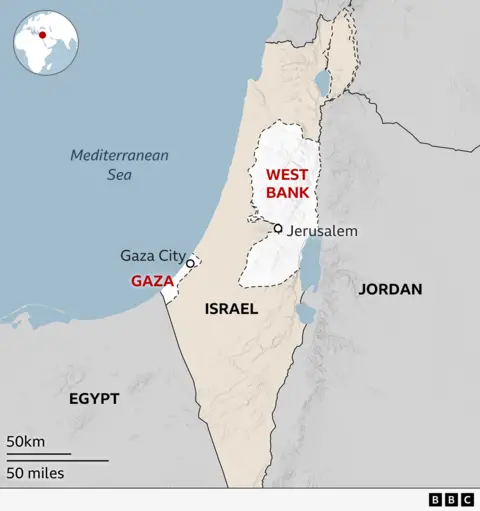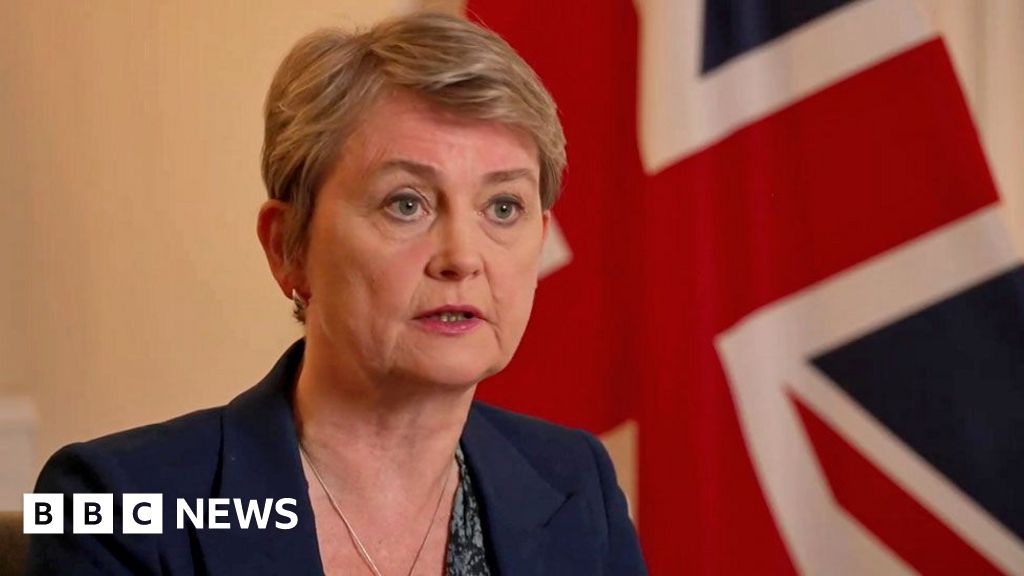James Landalediplomatic correspondent and
Ottilie Mitchell
Foreign Secretary Yvette Cooper says she has warned Israel not to annex parts of the West Bank in retaliation for the UK’s recognition of Palestinian statehood.
Cooper was speaking to the BBC before attending a conference on Monday at the UN in New York where France and other European states are due to make a similar announcement.
In what was a significant change in policy, Prime Minister Sir Keir Starmer announced the UK’s recognition of a Palestinian state on Sunday, along with Canada, Australia and Portugal.
Israel’s Prime Minister Benjamin Netanyahu condemned the moves, saying they give “a huge reward to terrorism”.
Asked by the BBC if she was concerned Israel would take this declaration as a pretext for annexing parts of the West Bank, Cooper said she had made it clear to her Israeli counterpart that he and his government must not do that.
She said: “We have been clear that this decision that we are taking is about the best way to respect the security for Israel as well as the security for Palestinians.
“It’s about protecting peace and justice and crucially security for the Middle East and we will continue to work with everyone across the region in order to be able to do that.”
Cooper said extremists on both sides were seeking to abandon any prospect of a two-state solution, which the UK had a moral obligation to revive.
“The easy thing to do would be to just walk away and to say well it is all just too hard,” Cooper said. “We just think that is wrong when we’ve seen such devastation, such suffering.
“Just as we recognise Israel, the state of Israel … so we must also recognise the rights for the Palestinians to a state of their own as well.”
She did not say when the UK’s Consulate General in East Jerusalem would become a full embassy, saying it would continue while a diplomatic process began with the Palestinian Authority.
The foreign secretary was speaking in New York, where the UN General Assembly is convening this week.
Cooper will push to build international consensus on a framework for peace in the Middle East, the Foreign Office has said.
France will co-chair a meeting alongside Saudi Arabia addressing the path to a two-state solution to the conflict, after it pledged to recognise Palestinian statehood in July. Belgium is also expected to follow France’s declaration at the meeting.
Making the announcement on Sunday, Sir Keir said he wanted to “revive the hope of peace and a two-state solution”.
Israeli Prime Minister Benjamin Netanyahu responded by saying that Palestinian statehood “will not happen”.
Speaking to BBC Radio 4 Today programme, Israeli government spokesperson David Mencer said that “the Jewish community will never forgive Labour for this betrayal” and accused the prime minister of an “abandonment”.
The US described the move as a diplomatic gift to Hamas after it attacked Israel on 7 October 2023, killing 1,200 people and taking 251 hostage.
Sir Keir stressed this was not the case as the terms of the recognition mean Hamas can have “no future, no role in government, no role in security”.
This message was echoed in a statement from the Foreign Office, which said the foreign secretary would use the UN meeting to “ensure violent terrorists like Hamas have no role to play in the future of a Palestinian state”.
The prime minister added that the decision was instead a “pledge to the Palestinian and Israeli people that there can be a better future”, saying the “starvation and devastation [in Gaza] are utterly intolerable”.
Sir Keir, who has repeatedly said Hamas can have no role in the future governance of a Palestinian state, said during his announcement that the UK had already proscribed and sanctioned Hamas and that he had directed work to sanction further Hamas figures in the coming weeks.
The UK’s minister for the Middle East Hamish Falconer said that “the time is right now because a two-state solution is under peril like never before.”
“The threat to two states living in peace, side-by-side has got worse and worse, he told BBC Breakfast.
Falconer stressed that “Hamas would not be the victors” and that “any Palestinian state would be demilitarised.”
Hamas on Sunday welcomed the recognition as an “important step in affirming the right of our Palestinian people to their land and holy sites” but said it must be accompanied by “practical measures” that would lead to an “immediate end” to the war.

Speaking on BBC Breakfast, the Conservatives’ deputy chair Matt Vickers said that the prime minister was “rewarding Hamas”.
“Hamas has already said this is a victory for them and the evil things they did on October 7”, he said.
“This is not the way you play the game, this not what you do if you want to get a two state solution.”
Sir Ed Davey, leader of the Liberal Democrats, told Breakfast that the move was “an essential path” towards a two-state solution but that “this is only a first step”.
“We need to put pressure on the Netanyahu government to stop the killing, to bring food in for the people of Gaza, and also to get the hostages out.”
Last week, a UN commission of inquiry said that Israel had committed genocide in Gaza.
Across a three-page resolution, the International Association of Genocide Scholars (IAGS) presented a litany of actions undertaken by Israel throughout the 22-month-long war that it recognises as constituting genocide, war crimes and crimes against humanity.
Around 65,000 people have been killed in Israeli attacks in Gaza in the nearly two-year war.
UN-backed health experts have also declared a famine in Gaza City.
The Israeli Foreign Ministry said the genocide report was based on “Hamas lies” and poor research, calling it an “embarrassment to the legal profession”.
Netanyahu has repeatedly denied starvation is taking place in Gaza and has said that where there is hunger, it is the fault of aid agencies and Hamas.
Palestinian Authority President Mahmoud Abbas welcomed the UK’s decision, saying it would help pave the way for the “state of Palestine to live side by side with the state of Israel in security, peace and good neighbourliness”.

Palestine is currently recognised as a state by around 75% of the UN’s 193 member states, but has no internationally agreed boundaries, capital or army – making recognition largely symbolic.
The two-state solution refers to the creation of a Palestinian state in the West Bank and Gaza Strip, with East Jerusalem as its capital, broadly along the lines that existed prior to the 1967 Arab-Israeli war.
Due to Israel’s military occupation in the West Bank, the Palestinian Authority, set up in the wake of peace agreements in the 1990s, is not in full control of its land or people. In Gaza, where Israel is also the occupying power, Hamas has been the sole ruler since 2007.
UK ministers have highlighted the continued expansion of Israeli settlements in the occupied West Bank, which are illegal under international law, as a key factor in the decision to recognise Palestinian statehood.
Mohammed Jarrar, mayor of the West Bank city of Jenin, told the BBC that “this Israeli government wants to annex the West Bank” – but stressed that recognition was important as “it confirms the fact that the Palestinian people possess a state, even if it is under occupation”.
Netanyahu repeated his intentions on Sunday, saying “we doubled Jewish settlement in Judea and Samaria [the West Bank] and we will continue on this path”.
Far-right Israeli minister Itamar Ben Gvir responded to the news by calling for Israel to annex the West Bank and dismantle the Palestinian Authority.


